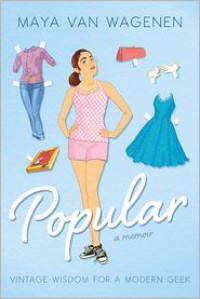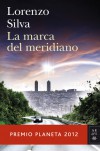Popular: Vintage Wisdom for a Modern Geek
 1.5 stars.
1.5 stars.Reviewing and rating this book was complicated, because there are many things that the main character does that I don't like and even found absurd. It would not be a problem if she were just a character, but she's a real person.
I'll start by saying that I didn't like this book. That it was short and really fast to read was the only reason why I finished it.
First of all, I found the title misleading. There's nothing that suggests that this girl is a geek. I was disappointed, as the geek part was what made me want to read this book. The Spanish title, Como me convertí en popular (How I became popular) is much more accurate. The author may be a geek, but there's nothing in the book that even implies it. Maybe her (or her school's) deffinition of geek is very different to mine.
The concept of this book is interesting, but I was a bit surprised by how innocent and naïve Maya was. Yes, she is thirteen and in some cases it's very obvious how young she is. For example, when she tries to reach out to others to convince them to go to a school event with her instead of skipping it because they don't have a date, she forgets that being a good friend also means respecting that not everybody likes the same things. She definitely shows that she's young when she keeps bugging them to say yes and doesn't take into account that not having a date may not be the reason why they don't want to go. Even if it is, they're free to choose not to go. However, there are other things that she does that seemed too naïve for thirteen, especially for someone who defines herself as a social outcast at the bottom of the popularity list. She takes fashion advice from a book written in the 1950s and wonders why people stare and laugh. The general ideas, such as showering/bathing regularly, ironing your clothes and wearing something nice to work are timeless, but she wears the exact clothes that the book suggests. I couldn't believe that she wondered why people were laughing. When I started this book, I thought that she was going to adapt the 1950s information to the 21st century, but she follows everything as it is in the book.
I liked how she realises at the end that all the people in her school have much more in common than they think. This was probably the only message in the book that I liked. I strongly disagree with most of what this book suggests. I'm not familiar with the US school system and my school was very different from Maya's, but the idea that thirteen year olds should wear make-up is ridiculous to me. There are a few other things that didn't make sense to me and made me wonder if someone more familiar with her culture and life style would have liked this book more. Maya's family doesn't have enough money to buy new clothes, so they get them in second hand shops, but it's implied that they eat dessert (and not of the fruit variety) and crisps-like snacks very often.
There's one thing I wondered that was never answered in the book. Her parents seem to be nice, so why don't they tell her how absurd some of the items in Cornell's book are? Can't they predict the result of some parts of her experiment? Also, there's a moment when her father (or her mother, I can't remember which one it was) tells her to keep everything a secret. It sounds a bit odd without further explanation and it made me wonder how much of her real diary was edited or how much of what was happening was never in her diary. Also, everything sounded just too nice and I never got the impression that she was an outcast. She has a few friends and the worst that she got were a few sarcastic (somewhat hurful at most) comments from her class mates.








